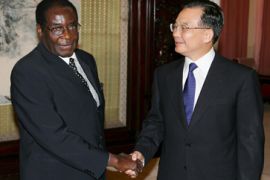Zimbabwe’s ‘special’ relationship
Harare’s close ties with Beijing may help politicians, but ordinary people lose out.

 |
| In the absence of Western investment, Zimbabwe has relied heavily on Chinese trade ties [GETTY] |
As direct foreign investment from the West dried up over the past few years, Zimbabwe’s economy started to go into free fall.
When the US and several EU countries spoke out vehemently against a land redistribution programme that saw white commercial farmers and their farm workers removed from the land, the Zimbabwean government looked to its old friend China for aid.
China and Zimbabwe have a history of co-operation, dating back to Beijing’s support for the military campaign Robert Mugabe, Zimbabwe’s president, waged against white rule in the 1970s.
China continued to help prop up Zimbabwe’s economy even as other foreign investors fled in recent years due to the forceful land redistribution programme and national elections in 2002.
| China: Special Report |
|
|
At the time, Western observers had said the elections were marred by wide spread vote-rigging and violence against opposition supporters.
The Western economic sanctions on Zimbabwe increased Harare’s reliance on China for imports of telecommunications, road building, irrigation and farming equipment, as well as a host of other critical items.
Chinese firms have contributed, sold or bartered arms, aircraft, buses, and hydroelectric generators to their African ally.
China is also said to have supplied building materials for Mugabe’s lavish mansion in a plush Harare suburb.
Chinese benefit?
As payback for standing by Mugabe during turbulent times, China siphons out millions of dollars worth of precious minerals.
Zimbabwe has the second largest reserves of platinum in the world and other precious metals, like gold and copper.
And the African nation has potentially billons in yet-to-be-exploited natural resources like coal-bed methane gas, huge coal reserves and immense hydroelectric power potential – as well as chromium, nickel and copper.
China is also a major consumer of tobacco and its companies have been given huge tracts of fertile land in Zimbabwe to grow the leaves and other agricultural products.
Financial aid
| IN VIDEO | ||
|
| ||
| More videos … |
China’s voracious appetite for these natural resources has resulted in its disbursement to Zimbabwe of soft loans with no-strings attached.
Zimbabwe has used these loans to finance schools, clinics, roads and other infrastructure.
In June, Morgan Tsvangirai, Zimbabwe’s prime minister, said an official had secured lines of credit worth $950m from China.
Zanu-PF, Mugabe’s party, had mocked Tsvangirai, Mugabe’s main rival, for failing to bring home much aid from his tour of the US and Europe earlier this year.
Zimbabwe’s government needs an estimated $8bn to rebuild the country’s ruined economy. Western countries have been wary of giving the government large amounts of cash, calling on Mugabe to halt alleged human rights abuses.
As the majority of Zimbabweans are poor, the country has become a big market for cheap Chinese products.
There are over 40 Chinese-run companies in Zimbabwe making a profit.
One store Al Jazeera visited sells products for as little as $0.16, and is always packed with customers.
Broken promises
A Chinese firm was given the contract to complete the Matabeleland-Zambezi water project – a dam meant to supply water to over a million people in the parched region.
Some $600mn is needed to finish the dam, which would take two years to complete if the money were available.
State funds to complete the dam dried up in 2007, and there is no indication that the $950m line of credit secured from China last month is being channelled toward it. But the dam has to be completed so people can grow more food.
Dumiso Dabengwa, from the Matabeleland-Zambezi water trust, says: “It should have been done yesterday. We started working on this project in 1990. By 1997, it [was] approved by government, and it’s supposed to be done as a matter of urgency. Up to this day, we still haven’t [finished].”
Analysts say China is under no pressure to help Zimbabwe finish this project. Zimbabwe needs China more than China needs Zimbabwe
“Had there not been a power like China that threatens to be the next super power to parallel with the United States,” says Brian Badza a political analyst in Harare,.
“I think by now, Zimbabwe could have been part of history, [and] by Zimbabwe, I mean the current administration.”
Who loses out?
While China and some politicians seemingly benefit from this cosy arrangement, ordinary Zimbabweans lose out.
Black farmers who benefited from the land redistribution programme struggle to get a good crop because the region is so dry.
Sheila Chinhamo, a Zimbabwean farmer, grows maize, ground nuts and rears cattle in the dry Matabeleland region.
“It has food shortages. Last year people, were dying of hunger,” she tells Al Jazeera. “There was hunger last year – because of the rains.”
Chinhamo says she does not believe the dam, which the Chinese are working on, will ever be completed.
Meanwhile, Chinese businesses continue to permeate Zimbabwean society.
The secretive nature of both the Chinese and Zimbabwean governments makes it difficult to know how the deals are being drawn up.
And it’s impossible to know how much of the country Mugabe has mortgaged off to China in exchange for political and financial support.

